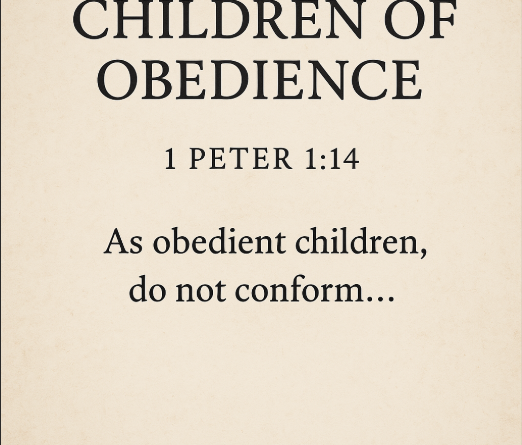Obedience Is Better Than Sacrifice: What It Means Today
You’ve probably heard the phrase a dozen times in sermons, Bible studies, or church conversations. It’s a short sentence that refuses to leave you alone because it challenges the easy religion of doing rituals while your heart drifts. The phrase obedience is better than sacrifice (1) hits the nerve of a faith that wants to look spiritual but doesn’t want to change. In this article, you’ll unpack the Scripture, see real-life application, and leave with practical steps to make obedience a daily practice—not simply a theological idea.
What the Bible Actually Says
The clearest place the Bible states this truth is when the prophet Samuel confronts King Saul. Samuel says, “Does the Lord delight in burnt offerings and sacrifices as much as in obeying the voice of the Lord?” and then delivers the memorable line: “To obey is better than sacrifice.” See 1 Samuel 15:22 for the full context. The Bible isn’t anti-worship; it’s anti-empty worship. The Scriptures want you to understand that ritual without righteousness is a dangerous substitute for relationship.
Samuel’s Example: When Form Replaces Faith
Saul came to worship, but he kept the best of the spoils and thought he could patch his disobedience with worship. Samuel’s rebuke shows you that God cares about obedience because obedience reflects the heart. The episode in 1 Samuel 15:22 forces you to look inward: are you performing religious acts to cover up choices you know are wrong? When you live by that performance pattern, you will miss God’s best. The message is simple and humbling: obedience is better than sacrifice (2).
Why This Matters to You
If you’re honest, you’ll admit it’s easier to show up than to change. It’s simpler to light a candle, drop money in the offering, or post an inspiring Bible verse than to ask God to root out sin or to make a hard decision that costs you comfort. But the biblical standard is different. When you obey, you align with God’s character; you reflect his priorities. That’s why the Bible repeatedly brings you back to this point.
Jesus Repeats the Truth
Jesus didn’t invent the phrase, but he taught the principle. When he quoted Hosea—“I desire mercy, not sacrifice”—and criticized religious leaders who were meticulous about ritual but sloppy about justice, Jesus made the point personal and immediate. See Hosea 6:6 and Matthew 9:13. Jesus said, “If you knew what these words mean, ‘I desire mercy, not sacrifice,’ you would not have condemned the innocent.” That rebuke is for you as much as it was for them. You can’t separate love for God from love for people.
When Jesus confronted the Pharisees, he used the same logic: ritual without compassion is hollow. See Matthew 12:7. He wanted you to know that obedience to God’s heart matters more than ticking off religious checkboxes. Obedience is better than sacrifice (3).
Why Obedience Matters More Than Ritual
Obedience is not merely a moral demand. It’s a spiritual posture that aligns you with God’s redemptive purposes. Rituals can be repeated mechanically. Obedience requires conversion of the will. That’s the difference between religion and relationship. When you obey, you replicate God’s character—justice, mercy, humility—in the world.
Scripture says, “To do what is right and just is more acceptable to the LORD than sacrifice.” See Proverbs 21:3. And Micah, in his poetic way, asks what the Lord requires of you: “to act justly and to love mercy and to walk humbly with your God.” See Micah 6:6-8. You’re not excused from worship; you’re warned against using worship to avoid obedience. The truth is concise and convicting: obedience is better than sacrifice (4).
The Heart Over the Act
God inspects not only your actions but the motives behind them. Psalm 51 puts it bluntly when David confesses that God does not delight in sacrifice as much as in a broken, contrite heart. Read Psalm 51:16-17. That’s why repentance and transformation are emphasized over ritual. When your heart is right, your acts become meaningful. When your heart is wrong, your acts are meaningless. The posture of the heart is non-negotiable for you who follow Christ.
Practical Ways to Choose Obedience Today
You may be wondering: “How do I practice obedience without becoming legalistic or judgmental?” Good question. Obedience starts small and becomes habitual. It’s not a single heroic act; it’s a thousand small choices to do what God says in ordinary life. Here are practical, pastoral steps to help you cultivate that habit.
Start by asking God every morning to show you one thing he wants you to do differently that day. Then do it. Obedience grows by simple, concrete choices—not by spiritual grandstanding. The daily disciplines of prayer, Scripture reading, and community give you the strength to obey. Remember James: “Do not merely listen to the word, and so deceive yourselves. Do what it says.” See James 1:22. Obedience is better than sacrifice (5).
Daily Obedience: The Small Choices
Obedience becomes your lifestyle when you practice it in small things: the way you treat your spouse, how honest you are at work, the kindness you show a stranger. Those everyday moments are where holiness is formed. Make a short list—maybe three specific choices—and ask God to help you follow through. Take accountability with a friend. Repent quickly when you fail. Obedience is rarely spectacular at first; it’s persistent.
- Wake up and ask God, “What is one thing you want me to do today?”
- When tempted to lie, choose truth.
- When called to help, move without calculating the cost.
These habits rewire your spiritual reflexes. They make obedience the default, not the exception. And again, remember: obedience is better than sacrifice (6).

Corporate and Personal Worship: Where Sacrifice Still Matters
You might worry that emphasizing obedience diminishes the role of worship, sacraments, or church traditions. Not at all. God invited sacrifice as an expression of devotion in the Old Testament, and Jesus honored worship. But the problem arises when these practices replace the obedience that shapes character. Isaiah challenges empty ritual when God asks, “Why do I have to be approached with your myriad sacrifices?” See Isaiah 1:11-17. Worship is designed to move you toward obedience. When it doesn’t, it’s incomplete.
Jesus also pointed out how religious leaders missed the weightier matters: justice, mercy, and faithfulness. See Matthew 23:23. Worship and sacraments are valuable because they shape you for obedience, not because they substitute for it. Keep participating in worship, but let it be a means to the end: a changed life.
Obstacles to Obedience and How to Overcome Them
Obedience is hard because it often costs you comfort, reputation, or security. Pride tells you you can negotiate with God. Fear tells you obedience will make you unpopular. Laziness convinces you that small compromises won’t matter. The first step in overcoming those lies is recognizing them. When you name the obstacle, you’ve already taken the first step toward removing it.
Scripture gives you practical antidotes: humility, faith, and community. The author of Hebrews reminds you that obedience sometimes requires endurance. And Paul teaches that the Spirit empowers you to live differently. The key is intentional reliance on God’s power rather than your own will. You’ll find that obedience is better than sacrifice (7) because it connects you to God’s enabling presence.
When Obedience Costs You
Sometimes obedience will cost you friends, promotions, or convenience. Consider Jesus’ words about denying yourself and taking up the cross. If the cost is real, remember you’re not paying for your salvation—Jesus already did that—but obedience positions you to experience God’s blessing and character formation. Paul told the Philippians to work out their salvation with fear and trembling because God works in you to will and to act in order to fulfill his good purpose. See Philippians 2:12-13. Trust that obedience, even when costly, produces spiritual maturity and fruit that lasts.
Spiritual Disciplines that Strengthen Obedience
You won’t become obedient by willpower alone. God uses disciplines—prayer, Scripture, service, fasting, and accountability—to shape you. These practices are not legalistic tasks; they are tools that help you hear God and obey him. Make a simple plan and stick to it. Start small and increase consistency.
Prayer opens your heart to God’s voice. Scripture gives you God’s priorities. Serving others tests whether you mean what you say in worship. Fasting helps you say “no” to impulse and “yes” to the Spirit. Accountability guards against self-deception. When you practice these regularly, the holy habit of obedience becomes more natural. Again, the point is clear: obedience is better than sacrifice (8).
Obedience as Worship in Everyday Life
Worship shouldn’t be confined to a building on Sunday. Every act of obedience can be an act of worship. Working honestly on Monday, loving your family faithfully on Tuesday, forgiving someone on Wednesday—these are worship acts when done for God’s glory. You worship by pursuing God’s will in ordinary moments. The early church understood this; their faith changed everyday behavior more than it changed religious ceremonies. The rhythm of your days should reflect the rhythm of obedience.
Hebrews teaches that Jesus’ sacrifice made a way for you to live a life of obedience empowered by grace. See Hebrews 10:5-10. That means your obedience flows from gratitude, not obligation. When your heart is rightly motivated, sacrifice and obedience work together—your worship becomes a life that demonstrates God’s love and truth.
The Community of Obedience
You don’t obey well alone. The body of Christ is designed to help you obey. Accountability partners, small groups, mentors, and pastors are not optional extras; they are central to spiritual growth. The earliest believers walked with one another, shared resources, and corrected one another in love. That’s why you should be part of a community that values obedience over show.
When you are connected to others who practice what they preach, obedience becomes contagious. It’s easier to obey when you see others doing the same and encouraging you through the hard stuff. Scripture gives you countless examples of community shaping character. Let the church be a training ground for faithful obedience.
Obedience, Sacrifice, and the Cross
People sometimes fear that emphasizing obedience undermines grace. Not so. Obedience is the fruit of grace, not the currency of salvation. Jesus accomplished what the law demanded, and through his sacrifice, you receive the Spirit who enables obedience. When Jesus called his followers to take up their cross, he invited them into a life of surrendered obedience that reflects his own life. The cross doesn’t diminish obedience; it empowers it.
Hebrews explains how Christ’s once-for-all sacrifice replaces the repeated rituals of the old system. See Hebrews 10:5-10. Yet the New Testament never reduces obedience; it redefines it by grace. Because of what Jesus did, you obey out of love and gratitude, not to earn something you already possess. That’s the gospel’s power: it moves you from duty-driven religion to Spirit-empowered discipleship. Keep this in mind: obedience is better than sacrifice (9) because it flows from the work of Christ within you.
Living Out This Truth: Practical Next Steps
You now know the biblical claim and the pastoral reasons behind it. The remaining question is practical: what will you do? Here’s a simple plan you can start today to make obedience a lifestyle.
- Identify one area where you’ve been practicing ritual instead of obedience—maybe prayer without listening, giving without generosity, or worship without compassion.
- Confess that to God and to one trusted person.
- Replace one ritualistic habit with one obedient action for the next thirty days.
- Reflect weekly on what changed in your heart and behavior.
These steps are simple but not easy. They require humility and persistence. But if you commit, you’ll watch your life change in ways that matter. Follow these steps because obedience is better than sacrifice (10). You’ll find the joy of aligning with God’s will, the peace of a cleansed conscience, and the fruit of a life that matters.
A Final Word: Your Call to Obedience
You’re not perfect, and that’s okay. God doesn’t call you to perfection as a condition for his love—he calls you to faithfulness as a response to his grace. Obedience is not a burden when you understand it as the path to Christlikeness. So start small, stay humble, and keep your eyes on Jesus. Let worship drive you to obedience, and let obedience deepen your worship.
If you’ll take one thing away today, let it be this: rituals without repentance will exhaust you; obedience rooted in grace will transform you. Make a deliberate decision now to choose obedience in the next hard moment you face. It will be better than any sacrifice you could offer.
Explore More
For further reading and encouragement, check out these posts:
👉 7 Bible Verses About Faith in Hard Times
👉 Job’s Faith: What We Can Learn From His Trials
👉 How To Trust God When Everything Falls Apart
👉 Why God Allows Suffering – A Biblical Perspective
👉 Faith Over Fear: How To Stand Strong In Uncertain Seasons
👉 How To Encourage Someone Struggling With Their Faith
👉 5 Prayers for Strength When You’re Feeling Weak

📘 Jesus and the Woman Caught in Adultery – Grace and Mercy Over Judgement
A powerful retelling of John 8:1-11. This book brings to life the depth of forgiveness, mercy, and God’s unwavering love.
👉 Check it now on Amazon
As a ClickBank & Amazon Affiliate, I earn from qualifying purchases.
Acknowledgment: All Bible verses referenced in this article were accessed via Bible Gateway (or Bible Hub).
“Want to explore more? Check out our latest post on Why Jesus? and discover the life-changing truth of the Gospel!”








